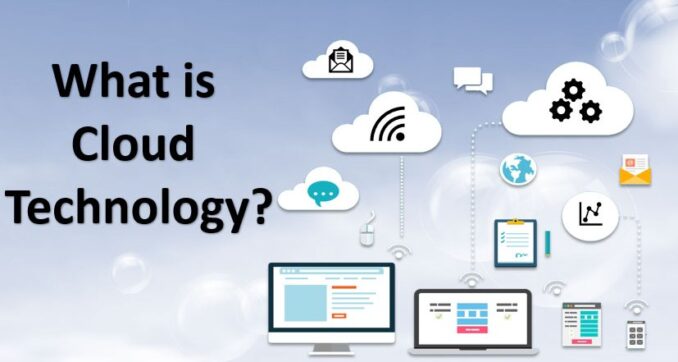If you are in everyday touch with modern technologies because of work – sometimes it is difficult for you to catch up and learn everything. Today, we have almost daily information about innovations in this field. Therefore, we can often find ourselves confused. In that pile of new terms – one, in particular, stands out. We’re talking about cloud technology. We will try to explain what is cloud technology – and what are its advantages and disadvantages. Don’t get scared of what you don’t know. Therefore, we will present 5 common myths & misconceptions that people have about cloud technology.
What Is Cloud Technology?

Source:laptrinhx.com
The term cloud computing refers to technology that allows us to use data and information – however, they are no longer stored on your computer, but somewhere in the cloud. That cloud is mostly the server of a certain company – which deals with the sale or rental of such virtual space. While it sounds a bit abstract, cloud technology isn’t that new. Namely, this technology has been present in developed companies for years. Many are already using such services – because it makes their business easier. What is it that makes this technology so popular and widely used? Here are some of the main reasons.
- You can use or operate the information from every place at any time.
- There are no fixed costs for the purchase and maintenance of equipment and software.
- Cloud is suitable for use by both small businesses as well as big companies.
- All you need is an internet connection.
- Data is centralized.
Cloud Business: Truths And Misconceptions

Source:networkworld.com
The market has recognized the importance of this type of technology – and a large number of companies are enjoying all possible benefits of using cloud services. Still, there are many of those who are intensively researching the area. Therefore, their views on businesses that use cloud technology are still full of contradictions. There are countless research and statistics on how much cloud technology is used, how fast the area is growing – and what numbers are expected in the years to come. But, there are also various misconceptions about this type of business, and here are the ones we encounter most often.
Myth 1: The cloud is not secure
This assumption is based on the premise that data stored physically somewhere outside the company’s servers. Therefore, people think it is automatically more compromised – than those stored in an internal data center. The fact that data on the cloud can be accessed from anywhere or on a device – doesn’t make it any more susceptible to hacker attacks. On the contrary! The prejudice that the cloud is not secure is simply not based on facts. For example, we can take IT giants like Amazon, Microsoft, and Google – who are well aware that without security they can’t offer much to their customers. On the other hand, keep in mind that their users are almost everyone else – from Netflix to the Pentagon.

Source:blog.coequalassociates.com
Myth 2: Working in the cloud means less control over your own data
If you choose to host your data on a cloud platform – your uninterrupted access to it will be possible at any time and from anywhere on the planet. Also, according to ConsoleConnect, almost all cloud providers provide administrator access and full transparency. Therefore, the control over your resources remains in your hands. By adopting cloud solutions, you don’t lose control – but only leave the tasks you want cloud architects and IT experts to do. A good cloud partner will take over the maintenance and optimization of the infrastructure, monitoring applications to achieve adequate security – and expanding resources in line with your growth and development.
Myth 3: The cost reduction
Experts claim that lowering costs is just one of the benefits of cloud technology. By switching to the cloud, you will get flexibility – that is, the ability to more easily manage your costs. However, it will also be necessary to invest in detailed training of your IT team. They should be well trained for optimization – so the cloud can be cost-effective for you. If this is not an option, you should consider hiring proven experts. You can let professionals take over the management of your infrastructure. They can help you overcome the challenges – and achieve even higher goals. This means increased agility and adaptability to rapid market changes. It also means better teamwork within the company – as well as increased security of cloud resources and optimized costs.
Myth 4: It is just a new and more advanced version of existing technologies
This is a complete misconception. Cloud should not be seen only as a new version of the technology that is otherwise familiar to us. It is a change in the way of business. Most of the solutions offered by Public Cloud providers can be implemented in a classic way – but it requires significant investment, effort, and time. Cloud is not only a technology but also a change in the way it works. Both IT and the company’s business.
Myth 5: We have everything we need, the cloud doesn’t interest us

Source:criticalcase.com
Cloud is a trend. One of the many research on this topic shows that by 2024 – software development, that is, cloud solutions, will grow three times faster than traditional software development. Like it or not, over time more and more business requirements will be solved by using the cloud.
Conclusion
The fact is that the use of cloud services for IT – requires the adoption of some new competencies. Therefore, the IT industry should take advantage of the opportunity provided when the focus shifts from infrastructure – to value for the business. It is also true that any such change is a challenge for all involved. Still, make sure these changes work in your favor. Experiment with cloud technologies, research, develop new competencies, be prepared – and of course, plan for the long term. When it comes to data security – make sure extra. Be sure to take all the necessary steps – inquire about cyber insurance – especially if you store business or customer data on the cloud.





